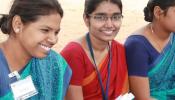Originally published by IAPB, Aug.4, 2020
Countries have agreed today to adopt a new resolution on vision in an effort to reach the 1 billion people worldwide who do not have access to vital eye care services.
More than 1 billion people are living with blindness or a vision impairment because they do not have access to basic services as simple as a pair of glasses.
The resolution cements the World Health Organization’s global strategy on vision set out in its ‘World report on vision’ launched by WHO Director-General, Dr Tedros Adhanom Ghebreyesus last year.
The World Report on Vision highlighted that:
- More than 2.2 billion people have a vision impairment or blindness, of whom at least 1 billion people do not have access to the services they need
- This is also an issue of fairness because the burden of poor eye health falls unequally on poorer countries and underserved populations including people in rural areas, for those with low incomes, women, older people, people with disabilities, ethnic minorities and indigenous populations.
- Poor vision and eye health needs are expected to increase substantially in the coming decades, with the number of people living with blindness projected to triple by 2050
The World Health Assembly (WHA) resolution urges countries to implement the recommendations of the World Report on Vision. Sponsored by over 40 countries, the resolution asks all governments to integrate “people-centred eye care” within national health systems. (Also read – WHA73: Our challenge for a new decade).
The Minister of Health, Australia, The Hon Greg Hunt, welcomed the adoption of the resolution, noting that it is an “important step in ensuring eye health is integrated in health systems as part of universal health coverage worldwide.” The Minister also acknowledged that the support of the resolution “sends a strong signal of worldwide interest in progressing these important public health issues. We now stand ready to work with the international community to take these commitments forward.”
The Minister of Health of the Republic of Indonesia, H.E. Ltg. (Ret.) Terawan Agus Putranto said, “We cannot continue to live in a world where one billion people are disadvantaged due to visual impairment or blindness. With this resolution the international community is saying loud and clear that we will not let our citizens be left behind because of lack of access to vision care.”
Bob McMullan, President of the International Agency for the Prevention of Blindness (IAPB), the peak body for eye health organisations worldwide, said “Today’s resolution demonstrates the increased recognition among countries of the importance of eye health for health systems and for sustainable development. The commitment from all 194 countries will go a long way to bolster eye care within nations – now it is time to turn this political goodwill into action”.
“Today’s resolution demonstrates the increased recognition among countries of the importance of eye health for health systems and for sustainable development. The commitment from all 194 countries will go a long way to bolster eye care within nations – now it is time to turn this political goodwill into action”.
The resolution comes at a time when eye care services are beginning to resume after months of suspension due to COVID-19.
Peter Holland, Chief Executive of IAPB adds “COVID-19 has posed significant challenges for eye health and the sector is currently facing a significant backlog of patients. It is therefore critical that eye health is properly integrated within health systems in order to address the challenges ahead and to avoid irreversible progression of eye diseases”. More than ever we now must strengthen intersectoral collaboration to address global challenges. Access to clean water for example, is not only relevant to fight the pandemic, but also to reduce the spread of neglected tropical diseases such as trachoma.
The resolution asks the WHO Director-General to increase support to countries in implementing the recommendations of the World Report on Vision; support the creation of a global research agenda for eye health; and to work with Member States to develop global targets on eye health for 2030 at the 74th World Health Assembly in 2021.
About IAPB
The International Agency for the Prevention of Blindness (IAPB) is an alliance of civil society organisations, private sector, and professional bodies promoting eye health through advocacy, knowledge and partnerships.
Seva Canada is a proud longstanding member of IAPB.


